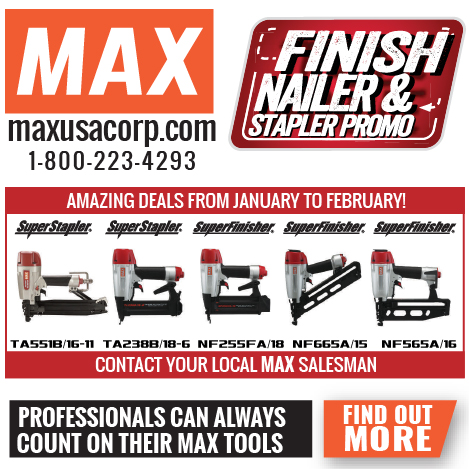ECHO Adds 10 New Products to Portfolio
ECHO Incorporated added 10 new products to its portfolio during its recent annual media event, Power-on-Athon 2024.
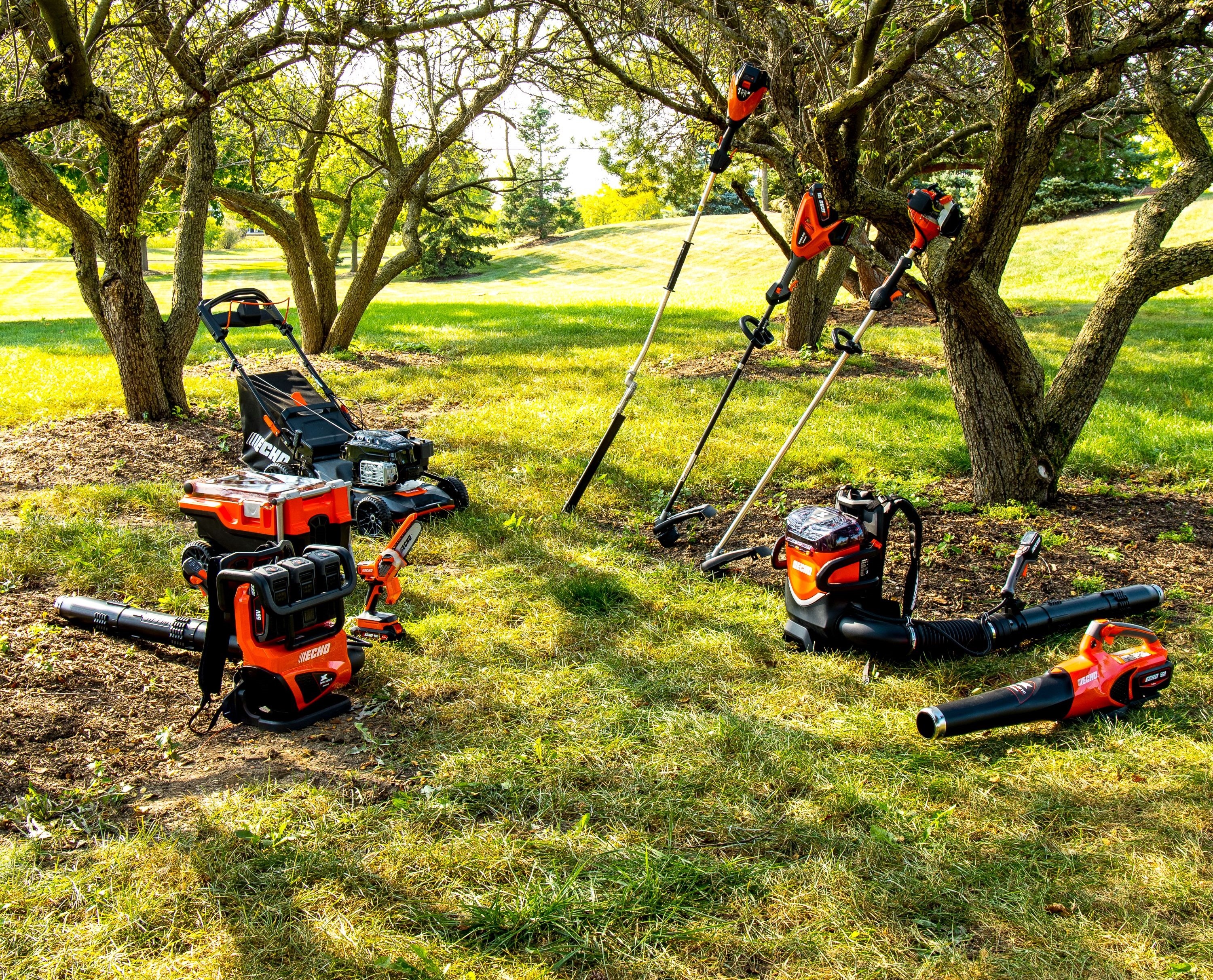 |
| ECHO Incorporated unveiled 10 new products set to debut in the Q1 2025 during a recent media event. |
The new equipment includes a self-propelled gas lawn mower, a category that hasn't been seen under the ECHO brand in decades. It also features a handheld battery-powered pruning saw, expanding the company's tree trimming and pruning offerings.
To round out the new products, ECHO, based in Lake Zurich, Illinois, introduced four battery-powered blowers, two string trimmers, a hedge trimmer and a 6-port rapid field charger.
Except for the battery-powered DPB-2500LE pink blower, which is available now as part of its Power for a Cure campaign to raise awareness about breast cancer research in partnership with Susan G. Komen, ECHO’s full new product lineup will officially launch in the first quarter of 2025.
The event furthered the company’s history of innovation, having released 154 new tools since 2017.
Although eight of the new products are part of the ECHO 56V battery system, CEO Harold Redman said the company is not defocusing its efforts on gas products.
“Whether it’s a consumer looking for a premium product like ours or a commercial landscaper looking for different gas products that we don’t offer, we’re still focused on development of gas product technology because we think it’s going to be here for a long time,” he said. “In addition to that, we’re investing in a net portfolio of battery products. It’s a matter of balance.”
The 10 new products are a mix of consumer and professional tools. Three new professional blowers, the DPB-2610 handheld and DPB-5900T and DPB-7700T backpack units were added to ECHO’s 56V lineup, offering seamless compatibility across all ECHO equipment, eliminating the need for tool-specific batteries.
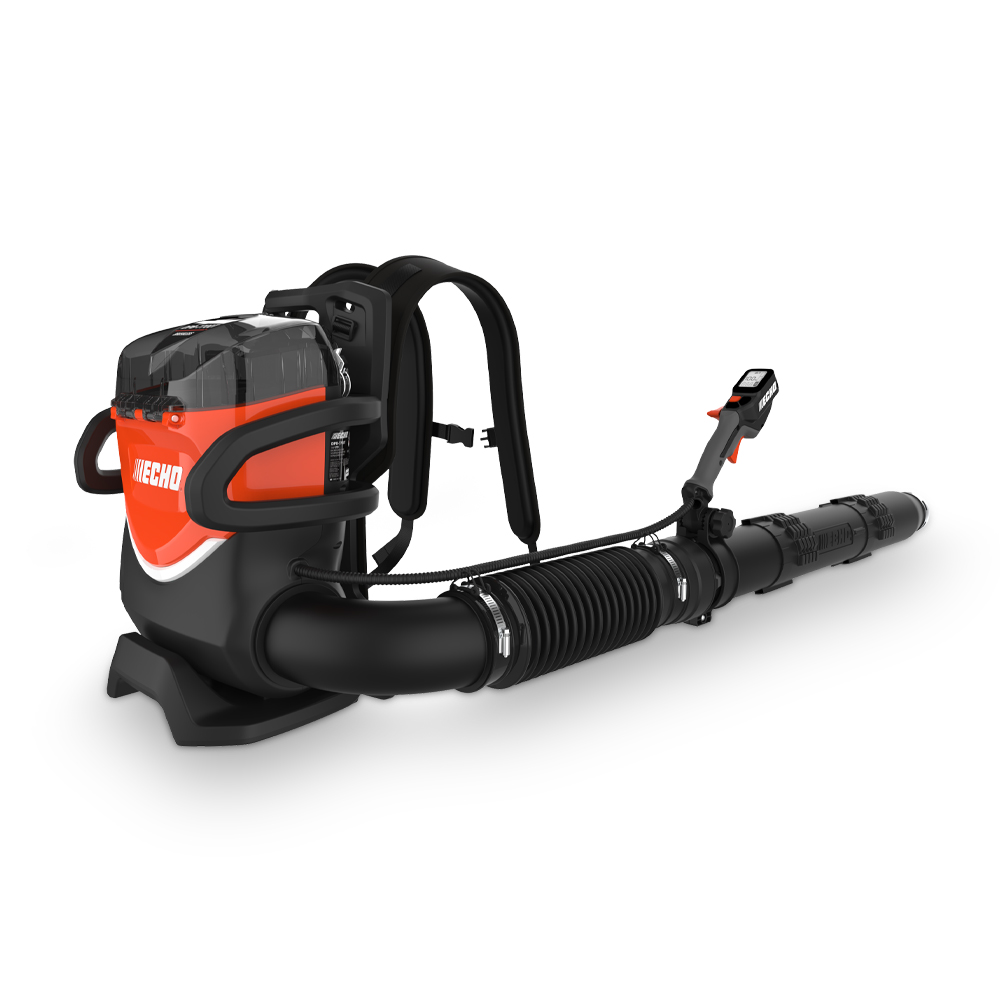 |
| Like ECHO's other two battery backpack blowers, the DPB-7700T also is a three-port design and uses cartridge batteries. |
“It's a key feature to have, so they have common batteries with our other handheld equipment,” said John Powers, ECHO director of product management. “That's a key thing that you want in a piece of commercial landscape equipment. You don't want to have separate batteries for backpack products versus your handheld products.”
Each blower comes with either a five-year consumer or two-year commercial tool warranty and a two-year battery warranty. In addition, all three blowers are equipped with MAXOUT technology and a metal wear ring at the end of the tube.
“These units feature MAXOUT technology, so the performance will stay constant through the runtime of the battery from low to high,” Powers said.
Paired with a 5Ah battery, the DPB-2610 delivers 549 cubic feet per minute and up to 158 mph airflow. Kitted with a battery and rapid charger, the MSRP is $299.99.
The first of the two new X series backpack blowers is DPB-5900T. Featuring a triple battery port to ensure extended runtime of up to an hour. With three 8Ah batteries, it delivers 795 CFM and airflow up to 195 mph.
Kitted with three 8Ah batteries and two dual-port rapid chargers, the DPB-5900T MSRP is $1,299.99.
Like the company’s other two battery backpack blowers, the DPB-7700T also is a three-port design and uses cartridge batteries. Distinguishing itself from its counterpart, the 7700T has a lid which provides some added weather resistance for the batteries.
“It does have a work light on the back, which lights up, to provide some added visibility if you're working in low light conditions,” Powers said.
A 36 Newton blower, the 7700T offers up to 850 CFM and up to 220 miles per hour of blow force.
Both new backpack blowers have LCD displays which will tell operators the state of charge of the battery, which of the three speed modes are available and which battery ports are active. Powers said the two backpack blowers can run on only two batteries, although that would reduce runtime.
According to Powers, at continuous high speed, the DPB-7700T can run for 26 minutes with three batteries at high speed. Comparatively, the 5900T has a max runtime at high speed of approximately 60 minutes. Typically, with these types of units, depending on what they’re doing, most contractors are not likely to have the blowers at full speed for an hour straight or even 26 minutes.
“If they're doing a leaf cleanup, probably they are, but if you're cleaning up after mowing, no, probably not,” Powers said. “Both these units are really designed for the commercial landscaper.”
He said either of the two new battery-powered backpack blowers is an ideal choice for someone who does primarily mowing and is using the blower to clean up afterwards or clean a construction jobsite.
“It's got plenty of power for that,” he said, comparing it favorably to ECHO’s PB-5810 and PB-755 gas blowers. “We've sold those units for probably 15 or 20 years, and it is very popular among commercial landscapers and performance wise these battery-powered units are very close.”
With that said, he admits that the DPB-5900T and DPB-7700T are not likely powerful enough to manage a New England fall leaf clean up.
“That’s really where units like our PB-9010 find their main market,” Powers said. In the Northeast, the large oak trees can fill yards nearly a foot deep in leaves and as he put it, to clean that up, “You need some serious mojo.”
In those locations or if cleaning up a parking lot, contractors are more likely to be running blowers full speed for large lengths of time.
“Most of the time, you're going to encounter fleets that have a mix of gas and battery equipment,” Powers said, admitting that, in some areas such as California, there are some crews switching to all battery-powered equipment.
“For right now, the majority of crews, if they're using battery, they're probably also using some gas equipment as well,” he said.
For scenarios like the mass leaf clean-ups in the Northeast, battery technology simply doesn’t exist yet that has that kind of endurance and power that could be wielded by an average person.
“There's a hard physics limit that we're waiting for, kind of the next revolution in battery technology to get there,” Powers said.
One of the challenges in any transition to battery-powered equipment is understanding the charging solutions. Some manufacturers are pushing entire trailers designed to continually charge batteries.
“It's awesome, but it's really not within reach of your average customer,” Powers said. “We're trying to come up with as many charging solutions for as many different usage cases as we can.”
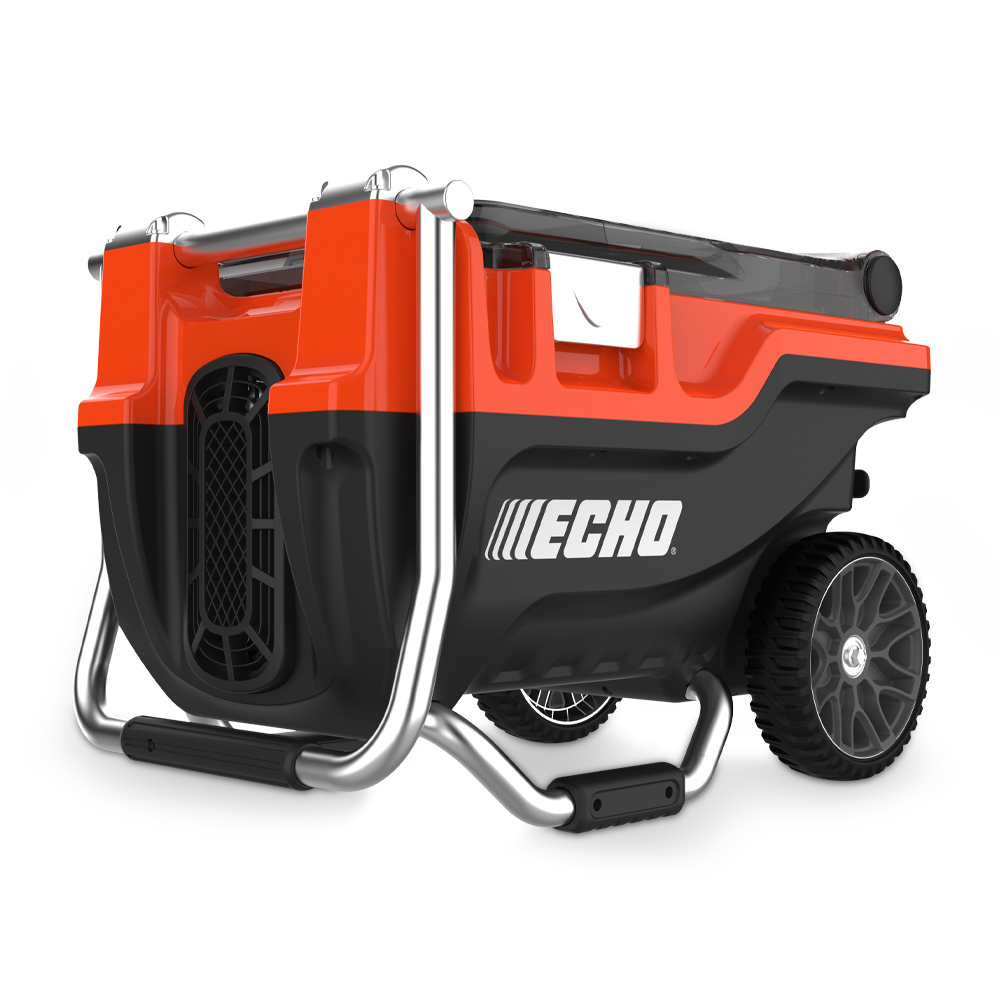 |
| The LC-56V4A6 6-port rapid field charger holds up to six of any of ECHO’s batteries, including the largest 8Ah model. |
Also, among the new products unveiled at the Power-On-Athon was a six-port rapid field charger.
“This item allows a commercial (contractor) to charge up to six batteries in the field, you just need access to a standard outlet,” he said.
The LC-56V4A6 6-port rapid field charger holds up to six of any of ECHO’s batteries, including the largest 8Ah model.
“A power bank is cool, but there's no way you can make a power bank/charger for $800,” Powers said. “We wanted something that, pricewise, is within reach. When you look at who commercial landscapers are, there are the big companies like Brightview, but if you look at quantity, there's way more, 1, 2 or 3 truck companies that don't have $75,000 to spend on charging an entire trailer. They need something that is within reach based on their company size.”
The rapid field charger has a latching lid and the ability to add up to two padlocks for theft deterrence. Also, he said the lid opens forward rather than to the side allowing access from either side depending on how the charger is being stored or placed.
Designed with a folding handle and wheels, the charge is easily transportable on and off a truck at a jobsite to wherever a plug is available.
In addition, Powers said the unit comes with a trailer mount and includes spots to wrap straps or chains to keep the charger from sliding around a trailer and offer further theft prevention. The mount can also be used as a wall hanger.
Another professional contractor level battery-powered tool launched by ECHO was the DSHC-2600 shafted hedge trimmer. Part of the company’s eForce and X series, it is designed with professional users in mind.
The DSHC-2600 provides gas-like power from a top-mounted motor powered by a 5Ah battery and featuring MAXOUT technology to ensure consistency. It has 21-inch RazorEdge blades and a 7-degree angled shaft to offer precise cuts. A rubber over-molded grip
Green Business Award
During the event, Village of Lake Zurich Mayor Tom Poyton awarded the company with the village’s Green Business Award, which recognizes businesses in village working to reduce their carbon footprints and contribute to a more sustainable future.
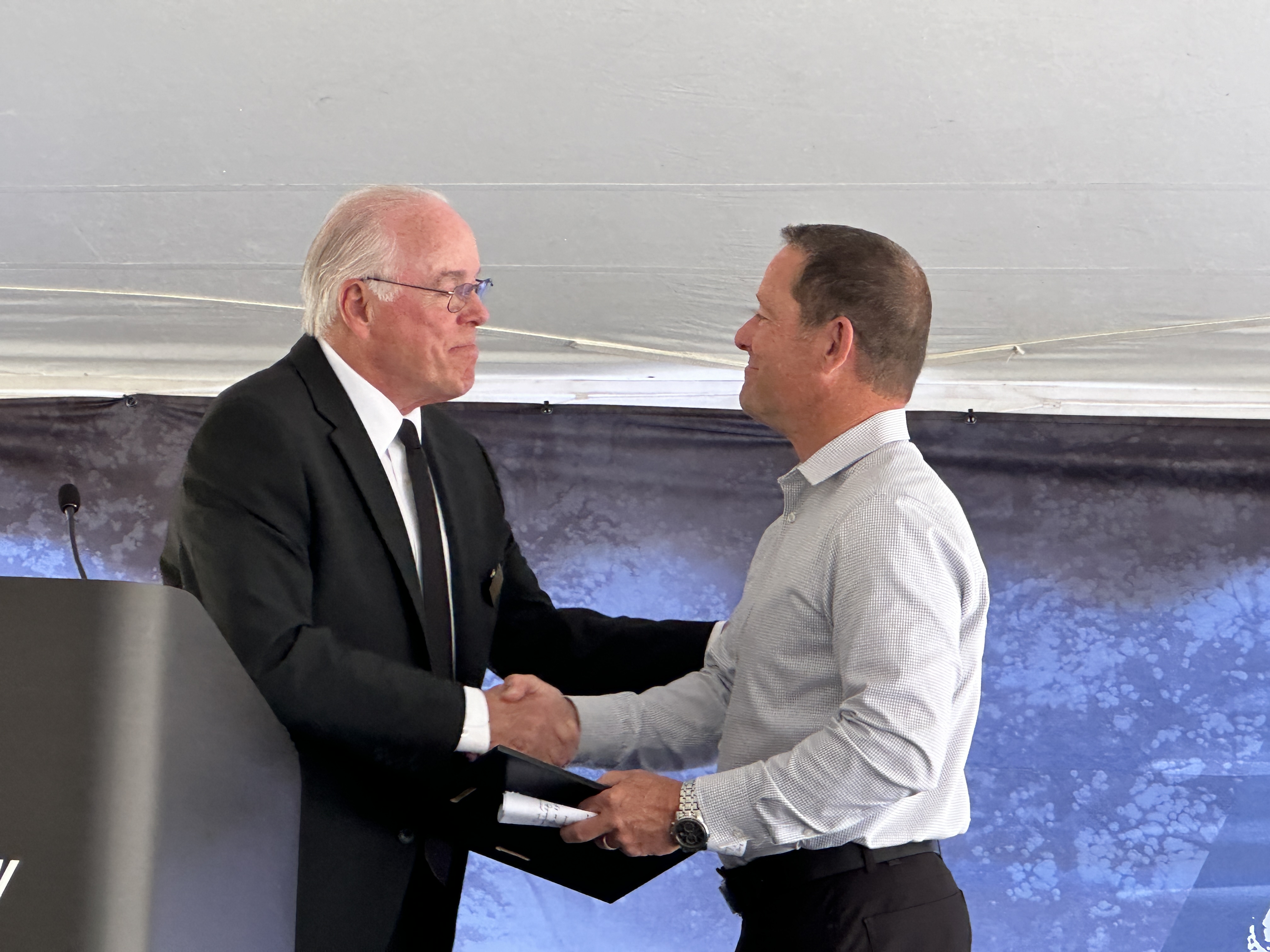 |
| Based in Lake Zurich, Illinois, ECHO Incorporated was recognized by the village for its sustainability initiatives with its Green Business Award. |
“ECHO is an amazing community partner and one of the best neighbors in our thriving industrial park,” Poyton said. “Not only are they creating hundreds of good paying jobs and juicing the local economy, but they also understand why being environmentally friendly is also good for business. They just get it and we’re happy to have their world headquarters here in Lake Zurich.”
The company was recognized for its initiatives in waste reduction, energy savings, a partnership with Integrated Lakes Management for routinely managing invasive species around its facility and prioritizing its employees with ADA-compliant floor plans and encouragement in community participation.
“It's part of the culture here at Echo, we have employees who show that passion,” Redman said. said. “They show that desire to make this business better, not only in the products that we make, but in the environmental initiatives that we pursue. They go beyond just those major initiatives that we've accomplished over the last few years.”
ECHO was founded in North America in 1972, establishing its headquarters in Lake Zurich in 1985. Today, with facilities totaling over 700,000 square feet, the company is one of, if not, the largest employer in the community with nearly 1,000 full-time and temporary employees.
“We are proud to be a cornerstone of both environmental progress and economic opportunity for Lake Zurich,” Redman said. Our employees are the key to fulfilling our initiatives, both in making quality products and looking out for the environment. With our desire to grow long term, we are working on a long-term plan to understand what growth and what investment we will make, including environmental initiatives to support our strategic goal.”
One of the company’s goals is waste reduction. ECHO regrinds 100% of its molded plastic scrap, totaling more than 400,000 pounds a year. Even the dust from the regrind process is sent out to a compound facility, re-pelletized and then reintroduced as regrind into production parts.
“When we talk about manufacturing, it's how much more efficient can we be in our initiatives,” Redman said. “Reducing waste can mean consolidating supplier shipments and buying in larger bulk to reduce our transportation mileage and cost, which has a positive impact on our carbon footprint. Over the years, we reduced our reliance on corrugated or cardboard materials and replaced that with reusable storage containers, which are manufactured here.”
From an energy use standpoint, ECHO installed a solar panel array on the roof of its facility, offsetting approximately 38% of its energy consumption. The solar array spells out ECHO across the roofline from an aerial view. In addition, the company uses LED lights and motion sensors for added energy savings.
Redman noted that from a product perspective, ECHO is constantly looking at innovative technologies to reduce emissions in gas engine products, whether it’s new ways to manufacture cylinders or new fuel options, such as the battery-powered line of products introduced in the last few years.
“Our initiatives go a little bit beyond the environment, such as our support for the community,” Redman said. “We are a business that feels responsible to take part in community activities, whether it's working for nonprofit organizations, participating in food drives or sponsoring local events. We feel compelled to participate in the community and continue to do a bigger and better job.”















